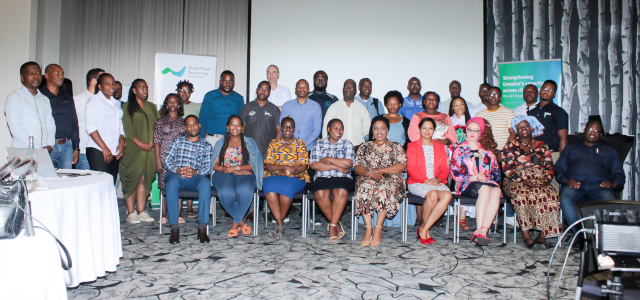National Coordinator for the Nationally Determined Contributions (NDC) Deepa Pullanikkatil said this as she opened the Stakeholder Consultation Workshop to develop a Roadmap for the National Designated Authority (NDA) to engage the Private Sector in implementing Climate Actions on 14 October 2022. She spoke on behalf of the Director of Department of Meteorology in the Ministry of Tourism and Environmental Affairs (MTEA).

Over 50 participants from government, civil society, private sector, financial institutions, development partners, youth and women organisations and academic institutions attended the meeting
The stakeholder consultation which brought together around 50 participants from Government, Non-Government, Private Sector, civil society, financial institutions, development partners, youth and women organisations, academic institutions, and others, was convened under the Green Climate Fund (GCF) Readiness and Preparatory Support Programme that the government of Eswatini is implementing with support from Global Water Partnership Organisation (GWPO) as a Delivery Partner. The GCF approved the project in November 2021, to support the Government of Eswatini to advance climate action processes by building on existing capacities.
In her opening remarks, Ms. Pullanikkatil further said the private sector also needs to take advantage of profitable opportunities that climate action offers the private sector through climate finance.
“In 2019, we experienced widespread wildfires- affecting tourism. Some years ago, there were widespread fires which affected the timber industry and affected wildlife which is important for our tourism sector. Agribusinesses are also affected by the fluctuating temperatures, dry spells, and storms. We can’t deny that climate change is affecting our businesses. We will discuss why private sector should participate in climate action. For two reasons, climate action offers profitable opportunities for the private sector and that climate action will help protect private sector’s investments from climate impacts,” explained Pullanikkatil.

Climate action offers profitable opportunities for the private sector-Ms. Pullanikkatil
The Kingdom of Eswatini is vulnerable to the increasing frequency and severity of droughts, floods and severe storms, and their impacts on key sectors such as agriculture, food, energy, health, as well as infrastructure. Experts say a large proportion of the Eswatini population has a low capacity to adapt to climate change and the predicted impacts are likely to be particularly negative on the rural population because of their high dependence on rain-fed agriculture and natural resource-based livelihoods.
Said Pullanikkatil; “Accessing climate finance is very important for Eswatini. Our NDC -climate action plan – which covers agriculture, health, water, ecosytems, energy, waste, gender, youth, requires $950million to $1.5billion. Only 5% can be met domestically, for the rest we need external climate finance and private sector investments. We are therefore grateful to GCF for supporting this project which will unlock some of this climate finance available through this GCF Readiness project.”
The stakeholder consultation meeting was therefore meant to among others review the findings of the assessment made on the roles and responsibilities of the NDA related to implementing the existing Private Sector Engagement Strategy in NDC Action and review findings on analysis of existing legislation and policies related to private sector participation in climate action.
In her presentation on Development of a Roadmap for the NDA to catalyse implementation of the Eswatini Private Sector Engagement Strategy in NDC Action, consultant Dr Nicollete Mhlanga-Ndlovusaid the government (NDA) does not have a clear mechanism on how to engage the private sector, adding that private sector efforts for climate change mitigation and adaptation are not widely understood nor accepted as good business practice.
“There is need for a full review of the regulatory and policy frameworks relevant to bankable private public partnerships to gain understanding on any legal or contractual constraints to their implementation. Government also needs to incentivise climate action through tax incentives; reducing bureaucratic hurdles to new technologies; and removing subsidies for high-emission sectors,” said Dr Mhlanga-Ndlovu.
Some of the participants felt that the private sector has for long not been part of these discussions. Stakeholders advanced that the private sector should be educated on what climate change means to them and their business and how to mitigate some of the climate impacts, citing the example of banks that are affected when farmers fail to repay loans due to low yields because of climatic changes.
Eswatini Bank representative noted that “there is work being done however it seems we are working in silos.” The Eswatini Bank indicated that they have since commissioned a study on the impacts of climate change on agriculture as this has affected the bank tremendously.
Another submission talked about the need of discussing climate change in monetary terms, highlighting the costs of inaction and how this would affect profits for the private sector.
This was the first stakeholder consultation for developing a private sector stakeholder engagement roadmap. The roadmap aims to catalyse and contribute to the implementation of the Private Sector Engagement Strategy in NDC Action and to develop policy recommendations to enhance an enabling environment for private sector engagement through an inclusive and participatory process. As such, this roadmap is expected to clearly outline a sustainable mechanism for continued engagement with private sector to enhance the role of the private sector in climate action in Eswatini.
Among others the meeting achieved the following as outcomes; review of the existing enabling environment for private sector engagement in climate action, identification of challenges and gaps that the NDA has in engaging the private sector identified and areas that NDA should consider regarding engaging the private sector in climate action with focus on accessing climate finance.
Some of the areas which were highlighted for the NDA to consider for strengthened private sector participation were building capacity of financial institutions to evaluate innovative projects, educating the private sector on the impacts of climate change and repercussions for their businesses, appointments of climate focal points in the different sectors and others. Stakeholders also recommended that the NDA should be operating at grassroots levels as well instead of only operating at the higher or national level. The meeting also resolved to strengthen coordination in the respective ministries through ministerial focal points.
Some policy recommendations which came up included issuance of soft or attractive loans, tax holidays or reduced tax to private sector investors in climate action activities or technologies.
The water sector talked on improving water governance and compliance which includes water usage and efficiency as an adaptation measure. Stakeholders also called for a review of existing legislation to make it an enabler including integration of climate change aspects in policies and legislation for the water sector.
The energy sector said there was a need to make available resources and skilled technicians to grow the use of solar in the country. They also called on the government to regulate the renewable energy space set standards for the equipment, so it is not flooded with cheap and unreliable technologies.
The agriculture sector talked of promoting the adoption of climate smart agriculture amongst individual farmers including promoting access to climate smart technologies.
Global Water Partnership Southern Africa Eswatini GCF Project Manager, Nqobizwe Dlamini through the workshop said, the overall programme will help “strengthen capacities of the Climate Change Focal Point and NDA (the Ministry of Tourism and Environmental Affairs) to engage with the private sector, prepare a gender action framework to guide gender considerations in project preparation, develop a financing strategy for water related climate technologies and further develop three water related concept notes for submission to the GCF.”
Photo credit : FutureLearn
